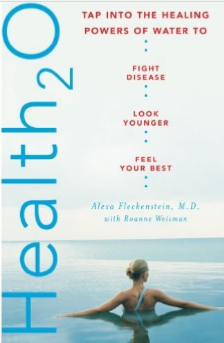What can we do to boost our personal immunity in addition to following all public health guidelines? I interviewed Dr. Alexa Fleckenstein M.D. to find out how to strengthen our immune systems against pathogens in general, not only the coronavirus. But no matter your health condition, it is important to consult with your healthcare provider about the following suggestions. You should ask about possible contraindications with respect to medication, and also about activities or herbs that might compromise cardiovascular problems or joint and muscle pain.
Trained and board-certified in the US in internal medicine, and European Natural Medicine in Germany, Dr. Fleckenstein is the author of several books on health and healing. Here are her six recommendations for boosting immunity.
1-Slim down. This pandemic has shown that extra weight puts you at higher risk for COVID-19. The risk comes from triple inflammation: Excess weight causes inflammation in your body, the Coronavirus causes more inflammation, and the immune system, as it gears up to fight COVID-19, adds still more inflammation. This can end in the so-called cytokine storm– the over-the- top reaction of the immune system that is thought to have killed millions of people during the 1919 Spanish Flu. “Inflammation in your body damages healthy cells, tissues, and organs which can lead to DNA damage, tissue death, internal scarring, and the development of many diseases. In normal times, our biggest concern is cancer. But now it is COVID-19,” says Dr. Fleckenstein. “We used to think that chubbiness was just a beauty problem. In reality, it is an inflammatory disease of the whole body.” A body-mass index of higher than 25 is considered overweight, higher 30 is obese, and over 35 is called morbidly obese. Dr. Fleckenstein advises not losing more than two pounds per month, as keeping your lower weight is more important than rapid weight loss.
IMPORTANT NOTE: CHECK WITH YOUR HEALTHCARE PROFESSIONAL BEFORE TRYING ANY OF THE FOLLOWING SUGGESTIONS TO MAKE SURE THEY WILL NOT INTERFERE WITH YOUR MEDICATIONS OR HEALTH CONDITION.
2-Try a daily 20-second cold shower after your warm /hot one. Research supports that cold water on the skin primes the immune system into normal function– avoiding overreaction as well as underperformance. Contraindications are: uncontrolled high blood [pressure, acute infection, arterial disease, arterial diseases like Raynaud’s, and frailty. Dr. Fleckenstein’s book, Health2 0, shows you how to use cold showers, which not only boost your mood and your immune system, but do so much more for your health. Recent research, reported in the US National Library of Medicine, supports the benefits of regular cold water on the skin:
“Notably, cold water immersion had significant and positive effects on metabolic and catabolic processes, neurotransmitters and hormones, immune parameters [my emphasis] as well as on more global markers of health, such as sick-leave and quality of life. Also, cold showers have been proposed to be of use in the treatment of depression and there are anecdotal and uncontrolled reports as well as news coverage on taking cold showers – usually in contrast to warm or hot water – showing positive effects for skin and hair. For example, cold water tightens and constricts the blood flow which gives the skin and hair a healthier glow and decreases transepidermal water loss contributing to better skin hydration, while hot showers can lead to dried out skin. Noteworthy, none of these studies reported negative events related to cold water treatment as well as no negative long-term effects.” [Source: 2019 study reported by the US National Library of Medicine, https://clinicaltrials.gov/ct2/show/NCT04130126]
(Note that it takes a few weeks to build up your immunity and reap these health benefits, so if your healthcare provider approves, why not start immediately?)
3-Get enough sleep. “Spend less time at the screen and go to bed before midnight, “says Dr. Fleckenstein. “The earlier the better.” Sleep plays a critical role in immune function, metabolism, memory, mood, learning, and other vital functions.”
4-Nutrition. Drawing on her experience and training in European Natural Medicine, Dr. Fleckenstein focuses on the true powerhouses of health: vegetables. Especially beneficial are roots such as turnips, rutabaga, parsnips, carrots, radishes; squashes, including winter squash; and leafy and bitter greens such as kale, chard, collard greens, mustard greens, and cabbages. Dr. Fleckenstein’s book, The Diabetes Cure, puts these ideas to work to overcome diabetes, but they work for other health problems too.
Dr. Fleckenstein cautions us, however, to avoid “nightshades”–tomatoes, colored peppers, and eggplants–which are technically fruits, not vegetables. Nightshades produce “lectins,” especially in their fruit, which make them hard to digest and contribute to inflammation–not what we need in a pandemic. Potatoes, which also belong in the nightshade family, are tubers, not fruit. Therefore, they contain far fewer lectins and are safer. Of course we should also avoid dairy, sugar, and simple (white) carbohydrates.
Even as we focus on healthy vegetables, we are also omnivores, says Dr. Fleckenstein, and need a bit of high-quality meats, fish and eggs in our diets as well. To fight infections, chicken soup has been shown to have wonderful antiviral properties, just as Grandma said! And for fun, great taste and even better immunity, you can add black seeds (Nigella sativa) to beans, stews, or muesli (unless you have an allergy).
5-Movement. Dr. Fleckenstein recommends any kind of daily movement to strengthen the immune system (plus your bones). Walking is the easiest and cheapest. Aim for 5,000 steps per day; ideal is 10,000. If you can’t leave the house during the pandemic, devise a course of your own with Jumping Jacks, squatting, Burpees (a type of exercise you can find on the Internet), and so on. Or find tai chi, chi gong, Yoga, and aerobic workout online classes to do at home. They are often free now. “But if you can, get outside,” says Dr. Fleckenstein. Moving in green nature gives an added layer of health, and emotional stress reduction and peace.” Swimming or floating in – preferably natural – water are also therapeutic.

Photo by alleksana on Pexels.com
6-Herbs: Nature’s pharmacy. Our bodies evolved for millions of years in concert with the herbs and plants of our planet. Natural, plant-derived medicines therefore provide ancient healing mechanisms that our bodies “know” how to use. As one herbal expert said, “If you take a vitamin A pill, your body keeps looking all day for the rest of the carrot.” So, of course, take whatever pharmaceuticals you are prescribed, but also consult with your healthcare practitioner about adding some healthy, immune-boosting herbs as well, as long as they don’t interfere with your other medications (such as anticoagulants) or your health condition.
For every day health-nudging benefits drink green or herbal teas: The old staples such as peppermint and chamomile are a good way to start the relaxing habit of drinking wholesome teas. Gymnema and holy basil have long histories of healing behind them, in their respective countries of origin, China and India. Stinging nettle is the plant most highly praised in European Natural Medicine. Sarsaparilla, licorice root, ginger, hops make good teas, too. In reality, it does not matter which herbal tea you are drinking – they all have healing qualities. Just don’t drink the same-old-same-old tea all the time. Rotate and explore! Every plant offers something different. These are all not specific teas against Coronavirus, just teas to improve your overall health.
For cooking, spice up your meals, along with your immune system, with turmeric and/or cinnamon, and preferably fresh herbs like rosemary, basil, sage, lemon balm, garlic, onions, chives, ginger, oregano, mints, and parsley. The “five defender” mushrooms (reishi, shitake, maitake, chaga, and turkey tail) help your immunity too. In addition to herbs, consider adding zinc, vitamin D, and low-dose vitamin C and to your regimen.
If you have an autoimmune disease, however, use caution with immune boosters and always consult your healthcare practitioner about their use.
Before you go: consider one more thing: For years, I have been participating in Laughter Yoga classes, which have now switched to be online, so you can do them wherever you are. When you laugh with others, laughter is contagious –in a good way. It relaxes the whole body. It triggers the release of endorphins, promoting an overall sense of well-being. When combined with yogic breathing, laughter truly becomes the best medicine, providing extensive health benefits. https://laughteryoga.org




